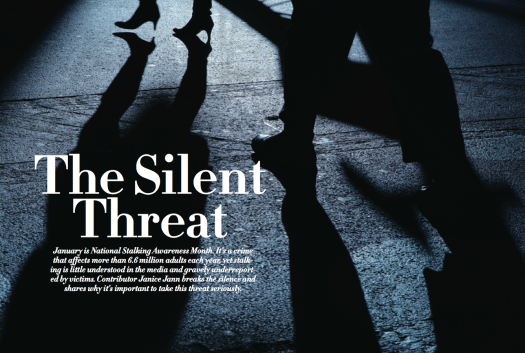January is National Stalking Awareness Month. It’s a crime that affects more than 6.6 million adults each year, yet stalking is little understood in the media and gravely under-reported by victims. Contributor Janice Jann breaks the silence and shares why it’s important to take this threat seriously.
ISSUE: Winter 2012-13
DEPT: Features
STORY: Janice Jann
The term “stalker” gets tossed around far too lightly these days.
“Ew, are you stalking me?” you joke when bumping into someone at the same frozen yogurt shop.
“I’m going to Facebook stalk him,” when you find out a friend has a new boyfriend.
But when you find yourself the victim of actual stalking, it’s no laughing matter.
According to Privacyrights.org, stalking is “harassing or threatening behavior that is engaged in repeatedly. Such harassment can be either physical stalking or cyberstalking. Physical stalking is following someone, appearing at a person’s home or place of business, making harassing phone calls, leaving written messages or objects, or vandalizing one’s property. Cyberstalking involves using the Internet or other electronic means to harass.” In a 2009 report, the U.S. Department of Justice found that 23 percent of stalking victims suffered some form of cyberstalking.
I met Harold* through mutual friends. I would describe myself as a friendly, outgoing person who opens up easily to strangers and tries to be welcoming to everyone. Even though Harold had an “off” about him from the get-go – in the detached ways he would strike
up a chat or how his questions were always a little too forward, a little too aggressive – I still maintained a welcoming spirit whenever I chatted with him.
The calls and texts were friendly at first. I kept my responses courteous and brief, not wanting to give Harold the wrong idea. That meant no happy face emoticons in texts, no giggles during calls.
But the attention persisted. It wasn’t just a text or a call here and there either. It was seven voicemails or texts in a row, starting out with “Hey, how are you?” or “Where are you?” and becoming “Why aren’t you responding to my texts?” “Did I do something wrong?” One after the other after the other. I found the attention a bit annoying but harmless. Harold was just a persistent person who wanted to be friends, I thought. But it reached a boiling point when one afternoon I saw seven missed calls and 14 text messages on my cell phone within the span of two hours, each message angrier than the last. Right then and there, I decided never to answer another one of Harold’s phone calls or texts.
Throughout the next year and a half, there were spurts of attempted contact. They always started out cordial, but were always followed by an avalanche of angry “WHY AREN’T YOU RESPONDING TO ME? ANSWER ME NOW” message. I felt helpless. I didn’t know what I should do, who I should tell. When I told some of my friends, they thought I was bragging or being overly paranoid. They
laughed it off like it was a joke.
But for me, it wasn’t a joke. Harold’s messages shook me up so much it caused countless nights of unrest. I constantly worried that I was being watched or that Harold would find me someway, somehow. My fears were not unfounded. He showed up at my workplace one day, flowers in hand. My co-workers, who were aware of the situation, called me on my cell and told me to stay home. He then showed up uninvited at a mutual friend’s wedding and was escorted out within minutes.
Jing* from Washington had a similar experience. “I met this guy once when I was out with mutual friends,” says the petite Chinese American. “He Googled my work info and started making calls. I asked him to stop calling me at work. I then agreed to get brunch with him, but canceled after I realized he memorized my birthdate and was using my information on my Facebook to communicate with me. Something was wrong. His calls were persistent, but shifted from calm to anger.”
Jing told the guy she wasn’t interested and to stop contacting her, but he persisted, leaving angry Facebook messages and texts demanding to know what he did wrong. “I just felt really alone in my situation,” says Jing. “I constantly had this feeling of discomfort, but didn’t know what to do about it.”
Uncomfortable feelings are the least of one’s worries when it comes to stalking. The statistics are grave. According to a study sponsored by the Office on Violence Against Women, more than 13 percent of women report having been stalked in college. Eighty-one percent of victims who were stalked by an intimate partner also report physical abuse. And 54 percent of female murder victims reported stalking to police before their stalkers killed them – while 76 percent of all those murdered were stalked at least once in the 12 months prior to their death.
“The link between stalking and dying is real, and it’s significant,” said Gary J. Margolis, a managing partner at Margolis Healy, a campus safety consulting firm, in a recent article on the online news site Inside Higher Ed.
When Mary* found herself the object of Terence’s* attention, she would just laugh it off with friends as a funny story. “Terence would call me sometimes at 2 in the morning saying really inappropriate things,” the 29-year-old Vietnamese American remembers. Mary tried to defuse the situation by having her boyfriend answer the phone and yell at Terence. But it became no laughing matter when one day, Mary was heading home and found Terence on her front porch, waving a butcher knife around. Luckily, Mary drove to safety and Terence was promptly arrested.
Though the 1998 National Violence Against Women survey found that Asian and Pacific Islander women were at significantly less risk of being stalked than women of other racial and ethnic backgrounds, many experts believe that that number is a result of underreporting, that traditional Asian values emphasizing close family ties and harmony may discourage Asian women from isclosing
physical and emotional abuse by intimate partners.
This was the case for Hannah,* who was being stalked by a family acquaintance. The 26-year-old Korean American told her parents about the situation, but they refused to confront the stalker and instead tried to quiet her down, telling her she was overreacting. For her parents, it was more important that they maintained “face” with the stalker’s family. As a result, Hannah began to drift from her family and eventually moved to a different part of the state for work, putting more distance between her and her stalker.
I experienced a similar reaction when I tried to tell friends and family. I ended up sharing my story on my blog because I really felt the severity of the situation and was frustrated that so many people – friends, family, the police – were not taking the situation seriously. After my post, a number of my friends individually emailed me to share their own tales. They said they never would have told me
had I not been so open with my experiences. “Thank you so much for sharing your story,” one friend told me. “It really helped me feel less alone.” And yet, when I asked if I could interview them for this story, many of them were hesitant. They didn’t want to cause any trouble. They had been conditioned – from society, from the media, from their own loved ones – to see persistent unwanted attention
as no big deal.
For those who may find themselves in a similar situation, remember, stalking is a big deal. “It’s the one area of gender and sexual violence that has a direct correlation to death,” said Margolis. “You’ve got to take stalking seriously.” You may not go so far as putting up your story on a blog or in a national magazine, but there are some things you can do right now.
- Set your profiles to “private”
It’s really incredible how much information we can find on a person over the Internet nowadays. Googling my own name, I find numerous images of myself, websites with my information on it, videos, etc. Granted, I work in media so I tend to be a little more open with my private life, but I’ve set all my information to “private” and am selective with who I choose to be friends with on social networking sites.
- Avoid posting information about your current or future locations
So many of my friends use Four-square or other devices on their cell phones to allow them to check into places they’re at, and I can only just shake my head. This just makes you easier to track down by potential stalkers.
- Learn about the stalking laws where you live
In California, a stalker is someone who willfully, maliciously and repeatedly follows or harasses another and who makes a credible threat with the intent to place the victim or victim’s immediate family in fear for their safety. The victim does not have to prove that the stalker had the intent to carry out the threat. The criminal penalty for stalking is imprisonment up to a year and/or a fine of up to $1,000. There are more severe penalties when the stalker pursues the same person in violation of a court restraining order, with a sentencing range from two to four years imprisonment. Persons convicted of felony stalking also face stricter penalties if they continue to stalk their victim(s). Courts may issue restraining orders to prohibit stalking.
- Inform the people around you about the situation
Tell your employer, co-workers, friends, family and immediate neighbors about your situation. Alert them not to give out any information about you to people inquiring about your whereabouts or schedule. Show them a photograph or give them a description of the stalker and his/her vehicle.
- Act promptly and firmly to discourage stalking
Take potential threats seriously. Very clearly tell that person to stop, saying something like, “Do not contact me in any way in the future.” People will often look at you like you’re a drama queen if you tell them you’re being stalked, but stand your ground. You are not overreacting or being overly dramatic.
- Keep a log of every stalking incident
Collect a paper trail. Transcribe phone messages, print out emails, save texts.
- Make a police report
Consider getting a restraining order, or at least call local law enforcement and let them know about the situation and that you are seeking some sort of resolution to your stalking problem.
- Carry pepper spray and take self-defense classes
Try to get out of the mentality that you are helpless and train yourself to be confident in case anything does happen.
Most of all, we need to remember that stalking is real, and we need to stop being afraid to talk about it. The more we share our stories, the less helpless victims will feel and the more we’ll learn about the appropriate actions we can take to empower ourselves. I share my story in that hope and I hope you will, too.
* Names have been changed









